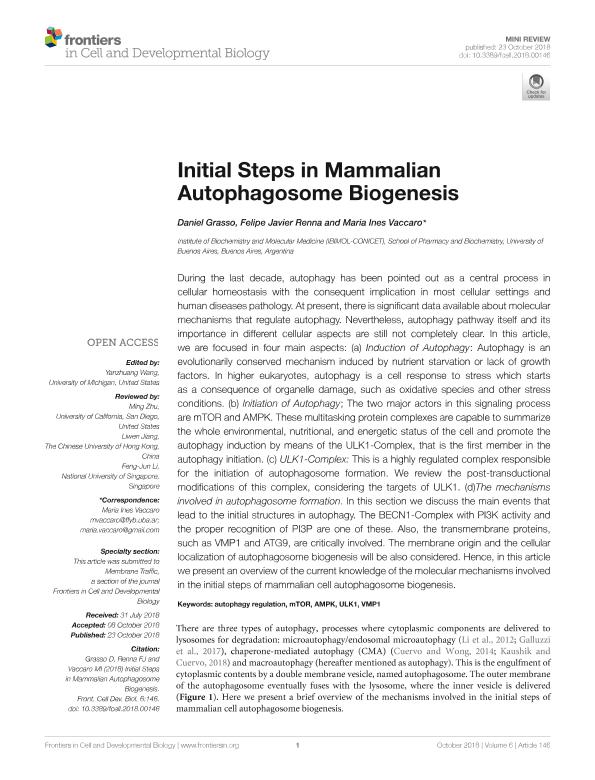Artículo
Initial steps in Mammalian autophagosome biogenesis
Fecha de publicación:
10/2018
Editorial:
Frontiers Research Foundation
Revista:
Frontiers in Cell and Developmental Biology
ISSN:
2296-634X
Idioma:
Inglés
Tipo de recurso:
Artículo publicado
Clasificación temática:
Resumen
During the last decade, autophagy has been pointed out as a central process in cellular homeostasis with the consequent implication in most cellular settings and human diseases pathology. At present, there is significant data available about molecular mechanisms that regulate autophagy. Nevertheless, autophagy pathway itself and its importance in different cellular aspects are still not completely clear. In this article, we are focused in four main aspects: (a) Induction of Autophagy: Autophagy is an evolutionarily conserved mechanism induced by nutrient starvation or lack of growth factors. In higher eukaryotes, autophagy is a cell response to stress which starts as a consequence of organelle damage, such as oxidative species and other stress conditions. (b) Initiation of Autophagy; The two major actors in this signaling process are mTOR and AMPK. These multitasking protein complexes are capable to summarize the whole environmental, nutritional, and energetic status of the cell and promote the autophagy induction by means of the ULK1-Complex, that is the first member in the autophagy initiation. (c) ULK1-Complex: This is a highly regulated complex responsible for the initiation of autophagosome formation. We review the post-transductional modifications of this complex, considering the targets of ULK1. (d)The mechanisms involved in autophagosome formation. In this section we discuss the main events that lead to the initial structures in autophagy. The BECN1-Complex with PI3K activity and the proper recognition of PI3P are one of these. Also, the transmembrane proteins, such as VMP1 and ATG9, are critically involved. The membrane origin and the cellular localization of autophagosome biogenesis will be also considered. Hence, in this article we present an overview of the current knowledge of the molecular mechanisms involved in the initial steps of mammalian cell autophagosome biogenesis.
Palabras clave:
AMPK
,
AUTOPHAGY REGULATION
,
MTOR
,
ULK1
,
VMP1
Archivos asociados
Licencia
Identificadores
Colecciones
Articulos(IBIMOL)
Articulos de INSTITUTO DE BIOQUIMICA Y MEDICINA MOLECULAR
Articulos de INSTITUTO DE BIOQUIMICA Y MEDICINA MOLECULAR
Citación
Grasso, Daniel Hector; Renna, Felipe Javier; Vaccaro, Maria Ines; Initial steps in Mammalian autophagosome biogenesis; Frontiers Research Foundation; Frontiers in Cell and Developmental Biology; 6; 146; 10-2018; 101-110
Compartir
Altmétricas




